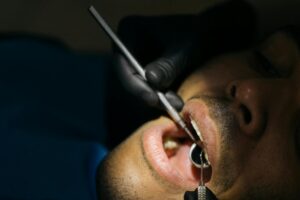Introduction
Oral health, as defined by the World Health Organization (WHO), is a key indicator of overall health, well-being, and quality of life. It encompasses the health of the teeth, gums, and the entire oral-facial system that allows us to smile, speak, and chew. Maintaining good oral health goes beyond just having white teeth—it’s about preventing diseases and ensuring your mouth is free from pain and infection.
You might have an oral health issue if you experience symptoms such as persistent bad breath, bleeding gums, toothaches, sensitivity to hot or cold foods, or swelling in your mouth or jaw. While some problems are immediately noticeable, others can develop silently over time.
There are several types of oral health issues, including:
- Dental caries (tooth decay) – caused by bacteria that destroy tooth enamel.
- Gingivitis and periodontitis – forms of gum disease that can lead to tooth loss if untreated.
- Oral infections – such as abscesses or fungal infections.
- Oral cancer – a potentially life-threatening condition if not caught early.
- Tooth erosion and sensitivity – due to acid wear or receding gums.
- Malocclusion or misalignment – which may affect chewing or speaking.
How Oral Health Issues Affect Overall Well-being
Poor oral health can have a serious impact on your general health and lifestyle. Oral infections and inflammation, particularly gum disease, have been linked to lifestyle diseases such as heart disease, diabetes, and stroke. An untreated cavity or gum infection can lead to intense pain, difficulty eating, and loss of sleep, which reduces your quality of life.
Additionally, dental issues can affect self-esteem and mental health. People with visible dental problems may feel embarrassed to smile or speak in public, leading to social withdrawal or anxiety. Children with untreated oral issues may also face challenges in school due to discomfort or frequent absences.
Benefits of Preventative Care
1. Early Detection Saves Money and Time
Routine check-ups and cleanings help identify small problems before they become serious. Treating a cavity early is much simpler—and less expensive—than dealing with a root canal or tooth extraction later.
2. Prevents Serious Health Complications
By managing oral health early, you reduce the risk of developing conditions that can affect the entire body. For example, treating gum disease in its early stages can prevent bacteria from spreading through the bloodstream and impacting the heart.
3. Helps Maintain a Beautiful Smile
Regular dental care and cleanings help prevent staining, plaque build-up, and decay—preserving both the health and appearance of your teeth.
4. Promotes Better Daily Functioning
Healthy teeth and gums make it easier to chew food properly, speak clearly, and enjoy meals without discomfort.
5. Boosts Confidence and Emotional Well-being
Maintaining a healthy mouth can improve your confidence and willingness to engage in social or professional activities without fear of judgment or embarrassment.
Importance of Early Detection
Early detection involves identifying oral health issues before symptoms become severe. Dentists use X-rays, exams, and oral cancer screenings to spot issues that might not yet cause discomfort.
For instance, oral cancer in its early stages often shows no symptoms but can be life-saving if diagnosed early. Similarly, minor gum inflammation, if treated promptly, can prevent periodontitis and tooth loss.
Children, adults, and seniors all benefit from early detection strategies, which include regular dental visits, professional cleanings, and personal awareness of changes in the mouth such as lumps, sores, or bleeding.
Conclusion
Oral health is a crucial part of overall well-being and deserves the same attention as other areas of healthcare. Recognizing the signs of potential issues and prioritizing preventative care can save time, money, and protect you from serious complications. Regular dental check-ups, proper brushing and flossing, and early treatment are simple yet powerful tools in safeguarding your smile—and your health—for years to come.




